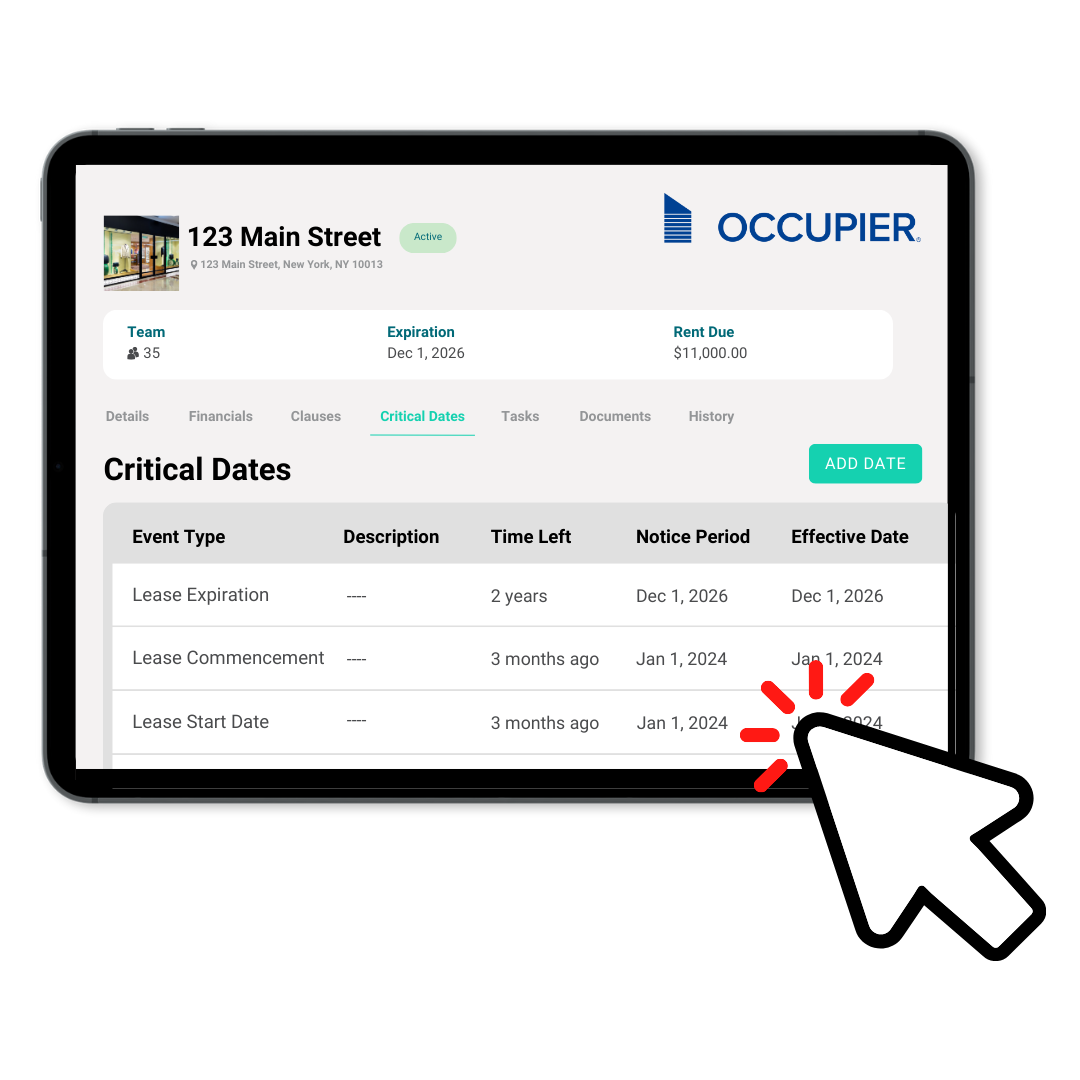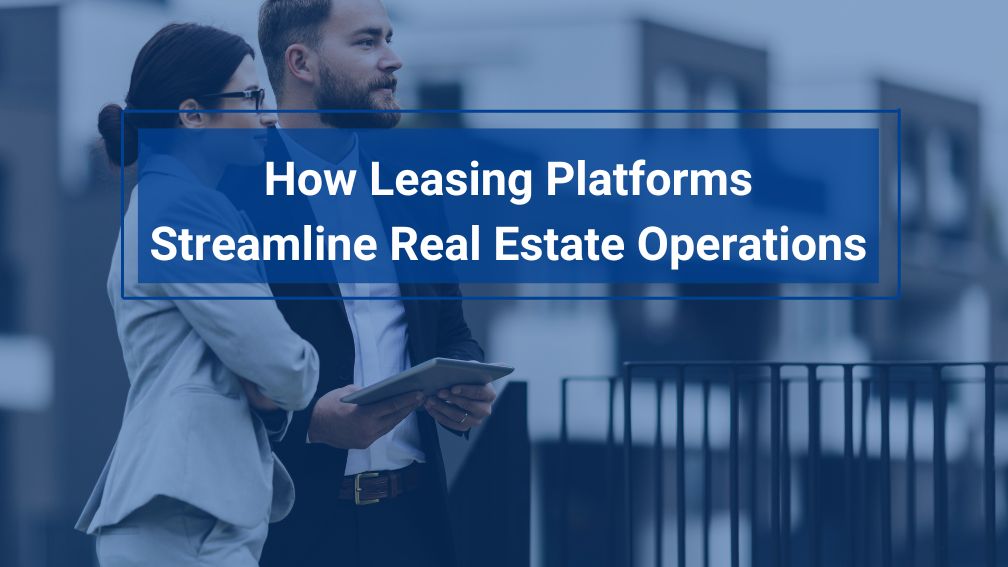Optimizing Real Estate: How Leasing Platforms Streamline Ops
Last Updated on May 9, 2024 by Morgan Beard
Real estate departments are often the last to adopt technologies. Instead favoring legacy tools, clunky interfaces, and siloed workflows. Modern leasing platforms are transforming the way commercial tenants manage their second largest expense, real estate. In this blog post, we will explore how leasing platforms enhance efficiency, reduce administrative burdens, and empower your team to focus on strategic growth.
Real Estate Operations
Real estate operations encompass a broad spectrum of activities involved in facilities management, leasing, and property maintenance. Whether it’s developing tenant experience, negotiating leases, maintaining properties, or optimizing portfolio performance — effective real estate operations are essential for maximizing space ROI and ensuring the long-term viability of real estate investments.
Managing leases entails not only drafting and executing lease agreements but also ongoing management — overseeing lease renewals, rent adjustments, modifications and compliance with lease terms. Lease administration involves tracking key lease data, such as lease terms, rent payments, and lease expiration dates, to ensure timely and accurate invoicing and compliance with lease obligations. Additionally, effective lease management involves addressing tenant inquiries and resolving lease-related issues promptly to maintain positive landlord-tenant relationships and mitigate potential disputes.
Real estate operations have historically been a manual process, with teams collaborating in spreadsheets, over email, in share drives or leaning on stale legacy point solutions.
The Power of Leasing Platforms
Modern leasing platforms are designed to be user-friendly and collaborative tools built to simplify lease management software workflows and accounting processes. They provide a centralized hub where you can effortlessly handle tasks such as lease negotiation, rent payments, data reporting and real estate workflows. By leveraging advanced technology and automation, these platforms eliminate the need for manual data entry and tedious paperwork, saving you time and reducing the risk of errors.
Simplifying Lease Management
Once you’ve executed a lease, moved into the space, lease management then becomes a critical aspect of your real estate operations. Leasing platforms simplify this process by providing a centralized repository for all lease agreements, amendments, and related documents. No more digging through stacks of papers or searching through multiple share drives. With a few clicks, you can access and manage lease data, track key dates, and stay on top of critical lease terms.
Furthermore, leasing platforms often offer automated reminders and notifications, ensuring you never miss important deadlines such as rent increases, lease renewals, or maintenance obligations. This proactive approach helps you maintain healthy landlord-tenant relationships and avoid potential disputes.
Efficient Lease Accounting and Reporting
Accurate and timely financial reporting is crucial for effectively managing your real estate portfolio. Leasing platforms should empower your lease accounting workflows, providing seamless synchronization of lease-related financial data. This eliminates the need for manual data entry and reduces the risk of accounting errors.
With customizable reporting dashboards, you can gain valuable insights into your real estate performance. Generate comprehensive reports on key metrics such as occupancy rates, rental income, lease expirations, and financial forecasts. These analytics empower you to make data-driven decisions, optimize your portfolio, and identify opportunities for growth.
The Collaborative Advantage
Leasing platforms are designed with collaboration in mind. They enable real estate, development, facilities, operations, finance & accounting to all work together seamlessly, improving communication and productivity. Here are some collaborative features to look for in a leasing platform:
- Document Sharing: Easily share lease agreements, amendments, and other documents with tenants and team members. Collaborate in real-time and keep everyone on the same page.
- Task Management: Assign and track tasks related to lease management, ensuring nothing falls through the cracks. Collaboratively work on lease negotiations, document reviews, and maintenance requests.
- Communication Tools: Leasing platforms often provide built-in messaging and chat functionalities, enabling instant communication between tenants and property managers. This efficient communication channel enhances tenant satisfaction and resolves issues promptly.
- Auditing and Permissions: Securely control access to sensitive lease data by granting permissions to specific team members. Track changes, maintain an audit trail, and ensure data integrity.
By leveraging collaborative features, leasing platforms foster transparency, accountability, and efficiency within your real estate operations.
The Future of Real Estate Management
As technology continues to advance, leasing platforms will evolve and offer even more sophisticated capabilities. From real-time visibility across your lease portfolio, accurate data and essential information at your fingertips, as well as asset management made easy. The future of leasing platforms is being built by modern and innovative software companies aiming to create a seamless leading experience for commercial tenants. Here are some trends to watch out for:
Machine Learning and Artificial Intelligence (AI)
Machine learning and AI technologies are revolutionizing various industries, and real estate management is no exception. Leasing platforms of the future may leverage AI algorithms to automate lease negotiations, analyze lease data patterns, and generate personalized lease recommendations. These technologies can free up valuable time for real estate professionals, allowing them to focus on higher-level strategic decision-making.
Internet of Things (IoT)
The Internet of Things (IoT) has the potential to transform how real estate properties are managed. By connecting various devices and sensors within buildings, leasing platforms can gather valuable data on energy consumption, occupancy patterns, and maintenance needs. This data can inform cost-saving initiatives, optimize building operations, and ensure a comfortable environment for tenants.
Sustainable & Efficient Buildings
The focus on sustainable and efficient buildings is driving real estate managers to implement environmentally-friendly practices and technologies. From green building certifications like LEED (Leadership in Energy and Environmental Design) to energy-efficient HVAC systems and smart building automation, the emphasis is on reducing carbon footprint, conserving resources, and lowering operating costs. Beyond energy efficiency, sustainable buildings also prioritize indoor air quality, water conservation, and waste management. By investing in sustainable building practices, real estate professionals not only meet regulatory requirements but attract talent and eco-minded consumers.
Tenant Experience
Tenant experience has emerged as a key differentiator in the competitive real estate market, with tenants seeking more than just physical space — they want an engaging user experience and supportive environment. Real estate managers are responding by curating holistic tenant experiences through amenities, services, and community-building initiatives. This includes amenities such as fitness centers, communal workspaces, and event spaces, as well as services like concierge, maintenance, and security. Moreover, fostering a sense of community through networking events, educational workshops, and social activities enhances tenant satisfaction, promotes retention, and strengthens the overall appeal of the space.
Embrace the Future with Leasing Platforms
Leveraging modern leasing platforms is the first step to optimizing real estate operations, enhancing efficiency, and driving growth across your lease portfolio. By automating administrative tasks, streamlining lease management, and enabling collaboration, these platforms empower you to focus on strategic initiatives that propel your commercial real estate business goals forward.
So, are you ready to embrace the future of real estate management? Explore the range of leasing platforms available today and discover how they can revolutionize your operations. Streamline your processes, enhance tenant satisfaction, and unlock new opportunities for success. It’s time to make leasing platforms your competitive advantage in the world of real estate.

Product Tour
Take a self-guided tour and see how the fastest-growing commercial tenants leverage Occupier for lease management & lease accounting.
